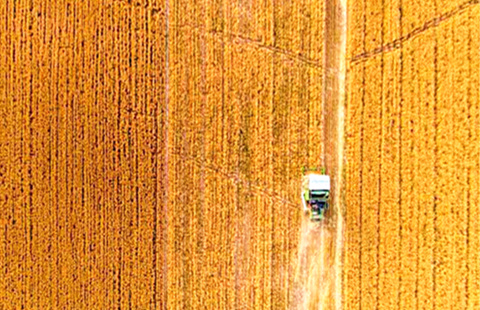The little-known legends in CPC history
On the eve of the 90th anniversary of the Communist Party of China’s birth, Xinhua News Agency organized a media group to revisit 90 year’s of red footprints.
The group?started?from Shanghai,the birthplace of the Communist Party of China, then went to the South Lake in Jiaxing (in Zhejiang province), Jiangxi, Jinggang mountain, Zunyi (in Guizhou province), Xiaojin (in Sichuan province), Yan'an (in Shaanxi province), Xibaipo (in Hebei province), and finally to Beijing and Shenzhen. A question was at the front of?the group members'?mind throughout the whole journey: What inspired the Chinese Communist Party to complete such a magnificent 90 years?
Each stop along the journey has its own epic tale.
Surrounded?with?clouds and mist,there stands?a simple monument on the top of Jiajin mountain, which commemorated the team that climbed the snow mountain many years ago. On June 12, 1935, the vanguard of the First Red Army climbed Jiajin mountain. They were ragged, but they had noble souls.
Now, 76 years later, Tibetans living in Jiajin mountain still piously worship the souls of the Red Army. In the places the Red Army went through in the western highlands, where the land is poor, the traffic is blocked, and the economy is backward, the people often have a natural septate sense with outsiders. However, we often found these residents supported the Red Army; in different ways maybe, perhaps they shared a common devotion. Where did the Party and the Red Army's appeal come from?
Every nation needs its own heroes.
Jiajin mountain is very tall with precipitous cliffs.What's more, in the mountains, the weather is changeable. As what the ballad says, "to cross the Jiajin mountain, unless the gods come to the earth." But the Red Army answered confidently, "We are the god!"
Today, even with the?modern means of transport, crossing the Jiajin mountain is still not an easy task.?The group?came to the peak by car, and felt the razor-like wind, which made even standing very difficult. When the Red Army crossed the mountain, there was no road, no cars. Most of the soldiers were Southerners, and for them the pressure of climbing a snow mountain was not less than a bitter battle. This is not a hill in the Jiangxi soviet area, but a cloud-obscured, risky, unpredictable snowy mountain.
Today, we can not know how many Red Army soldiers died on the mountain. These southern soldiers were not prepared for the effects of altitude. No doubt they thought of slippery slopes, the cold, fatigue and difficulty breathing, but most of them did not think of death. The stretcher-bearers and cooks died the most - the load of stretcher-bearers was too large, and they did not want to leave behind those wounded in combat, until they were exhausted themselves, while the cooks also carried heavy loads when climbing, perhaps even more than the stretcher-bearers, as they always wanted to bring more food to avoid soldiers’ hunger.
The Red army climbed many snow mountains in addition to Jiajin mountain, including Mengbi mountain, Dagu mountain, Yakexia mountain, Dechang mountain, Yulong mountain, Big snow mountain, Small snow mountain, Haizi mountain, Maya mountain, Maila mountain, Degequer mountain, and at least 10,000 soldiers died in these mountains. Now their remains have become part of the mountains, and the footprints they left remain forever in Chinese revolutionary history, like a sculpture.
The harshness of the nature compels human beings to maintain awe, but also stimulates noble pursuits. After the test of legendary sacrifice and perseverance in the Long March, the Chinese Communist Party had a team of the most steadfast revolutionaries. In 1935, Zhou Enlai, when he crossed Jiajinn mountain, suffered from a severe coughed, and became seriously ill. When he descended into the grassland Zhou Enlai’s high fever continued and he could not walk. Peng Dehuai only said one word: "Lift!" Xiao Jinguang transferred some soldiers from the mortar team to compose a stretcher team, and Chen Geng volunteered to be the stretcher captain, Yang Lisan insisted on carrying the stretcher for Zhou, and they carried Zhou Enlai off the grass step-by-step.
In 1955, the new Government endowed their own senior officers, and eight of the ten appointed marshals had crossed Jiajin mountain. They were Zhu De, Peng Dehuai, Lin Biao, Liu Bocheng, Luo Ronghuan, Xu Xiangqian, Nie Rongzhen, and Ye Jianying. In addition seven of the ten appointed generals had crossed Jiajin mountain. They were Huang Kecheng, Chen Geng, Tan Zheng, Xiao Jinguang, Zhang Yunyi, Luo Ruiqing, and Wang Shusheng.
Revolutionary heroism, conviction, and the fearless sacrifice, all concentrated in the Communist Party of China’s 90-year journey along a bumpy road, brought profound change in China, and brought to the world eternal spiritual wealth. Edgar Snow, who wrote the “Red Star Over China”, predicted: the Long March is an exciting past, and now it will still get the people of the world's admiration and passion.
Edited and translated by Han Xiaopeng
- China issues guidelines to develop 'all-for-one' tourism demonstration zones
- Torrential rain triggers disaster in Southwest China
- Harvest time for wheat reapers in Shanxi
- Over 200 couples marry in Changchun group wedding
- Calligraphy tops other icons of Chinese culture, WeChat data shows


























